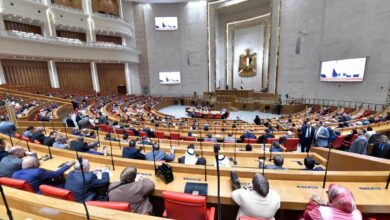Ramadan lanterns are still imported into Cairo, as are prayer carpets, rosaries and white gilbabs, all of which are also exported, from China, to Riyadh. When I was in Beijing last week, I searched for these products, but, of course, I didn’t find any of them. I found that understandable because the Chinese citizen has nothing to do with such products. In fact, they are manufactured specifically for our markets and have been exported to our countries year after year. What I couldn’t understand, however, is the huge difference in quality between the products the Chinese people export to us and the ones they consume themselves.
When I asked Ambassador Ahmed Rizk about the reasons for such a discrepancy, he said that Egyptian importers ask for the cheaper products which better suit the limited-income Egyptian consumer. Chinese products are tailored to suit the needs of the importer and his purse. Therefore, a Chinese-made shirt sold in Beijing is of a much higher quality than a Chinese-made shirt sold overseas. This is quite logical, given that the average annual salary of a Chinese consumer is over US$5000.
If the Chinese government does not intend to stop dumping Egyptian markets with such mediocre products to protect the reputation of its industry and the country in general, then we should work on attracting their manufacturers to come and manufacture their products in Egypt. But such a move requires officials to seriously encourage foreign investment.
It’s extremely sad that the volume of Chinese imports to Egypt amounts to LE5.5 billion a year, while our exports to China stand at a humiliating US$400 million a year.
But the situation won’t be rectified until the state shows interest in serious investors, both ours and theirs, and provides a favorable investing environment. The state could also make it a yearly tradition to honor the best and most serious investors.
Our officials of course need to put an end to underhand deals with investors. But officials are often too scared to open the way to investments lest they are accused of bias toward certain businessmen. Dealing strictly with investors should not be the way an official has to make it known he’s a fair player.
The investor is innocent until he’s proven guilty. This is how it should be.
Translated from the Arabic Edition.




